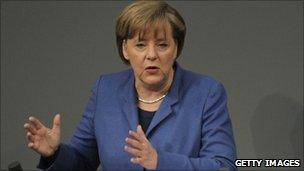Japan crisis: Germany to speed up nuclear energy exit
- Published

The German chancellor said it was impossible to return to 'business as usual'
German Chancellor Angela Merkel has announced a "measured exit" from nuclear power in response to the crisis affecting four reactors in Japan.
Defending the temporary closure of Germany's seven oldest reactors, she said the Japanese disaster meant it could no longer be "business as usual".
Mrs Merkel told parliament that the goal was "to reach the age of renewable energy as soon as possible".
She urged Germans to show the Japanese people they were not alone.
She said the two countries had 150 years of diplomatic relations and called on Germans to donate money. "This is help between friends," she said.
Although she stressed that Germany's nuclear plants were among the world's safest, she said that "when, in Japan, the apparently impossible becomes possible and the absolutely unlikely reality, then the situation changes".
Heckled by her opponents, she said the future of energy policy would be carefully considered in the next three months, adding that changing to renewable energy would require a broad consensus.
Chancellor Merkel has come under fire from opposition politicians as well as the nuclear industry for her abrupt change of stance on atomic energy and she was jeered as she addressed the Bundestag (lower house of parliament) on Thursday.
Last year, her government extended the life of Germany's 17 nuclear power plants by 12 years but suspended the decision for three months in the wake of the Japanese crisis. The decision to shut down seven of the oldest reactors temporarily soon followed.
The Isar-1 reactor in Bavaria is set to go offline shortly, followed by Neckarwestheim, a reactor that has been the focus of large protests in Baden-Wuerttemberg, where Mrs Merkel's Christian Democrats face a tight election battle on 27 March.
The leader of the opposition SPD Sigmar Gabriel accused the chancellor of electioneering and of bypassing democratic debate over Germany's atomic energy.
"You only involved the Bundestag pro forma and didn't involve the Bundesrat [upper house] at all. You had already arranged everything with the gentlemen from the nuclear industry," he said.
- Published15 March 2011